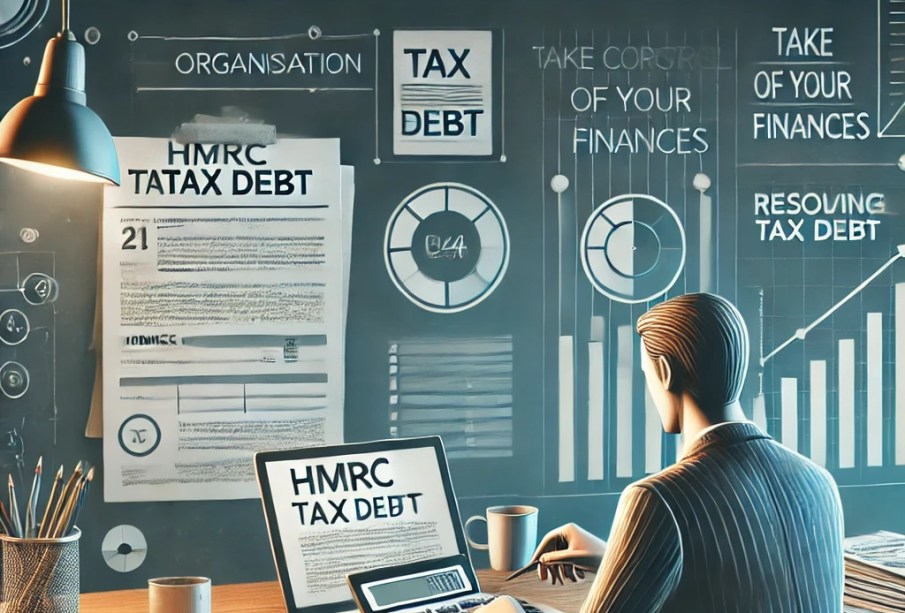How to Deal with HMRC Debt: A Practical Guide

Dealing with debt owed to HM Revenue and Customs (HMRC) can be daunting, but taking proactive steps can help you resolve the situation and regain control of your finances. Whether it’s overdue tax payments, penalties, or unexpected demands, addressing HMRC debt promptly can prevent further complications, such as enforcement action or additional interest charges.
In this blog, we’ll explore the causes of HMRC debt, its potential consequences, and practical steps to manage and resolve it.
What Is HMRC Debt?
HMRC debt arises when individuals or businesses fail to pay taxes, such as:
- Income Tax: Underpaid taxes from employment or self-assessment.
- Corporation Tax: Unpaid taxes by companies.
- VAT: Overdue Value Added Tax for businesses.
- PAYE/NIC: Missed payments for Pay As You Earn or National Insurance Contributions.
- Penalties and Interest: Charges for late payments or inaccuracies in tax filings.
Consequences of HMRC Debt
Failing to address HMRC debt can lead to serious consequences, including:
- Interest and Penalties: HMRC charges interest on overdue amounts and may impose late payment penalties.
- Enforcement Action: HMRC has the authority to take enforcement measures, such as:
- Issuing a County Court Judgment (CCJ).
- Using debt collection agencies.
- Applying for a winding-up petition for companies.
- Seizing Assets: Through a process called distraint, HMRC can seize and sell assets to recover unpaid debts.
Steps to Deal with HMRC Debt
1. Don’t Ignore the Debt
Ignoring HMRC debt will only escalate the problem. Open all correspondence and respond to HMRC as soon as possible.
2. Review Your Debt Details
- Check the amount owed and ensure it’s accurate.
- If you believe there’s a mistake, contact HMRC to discuss your concerns.
3. Contact HMRC Early
HMRC is often willing to work with individuals and businesses who communicate proactively. Call their helpline to discuss your situation and explore repayment options.
4. Set Up a Payment Plan
If you can’t pay the debt in full, HMRC may agree to a Time to Pay Arrangement, allowing you to spread payments over a more manageable period.
- Be honest about your financial situation.
- Stick to the agreed payment plan to avoid further action.
5. Seek Professional Advice
If your debt is complex or you’re struggling to negotiate with HMRC, seek advice from:
- Tax Advisors: Specialists in dealing with HMRC.
- Debt Charities: Organisations like StepChange or Citizens Advice can offer free support.
6. Consider a Loan or Credit Option
If you can access affordable credit, using a loan to clear your HMRC debt may be an option. However, ensure the interest rate is reasonable and manageable.
7. Check Eligibility for Tax Relief
In some cases, you may qualify for tax relief or adjustments that reduce your debt. Consult a tax professional to explore your options.
8. Prioritise HMRC Debt
HMRC debts are considered priority debts due to the severe consequences of non-payment. Prioritise these over non-essential or unsecured debts.
Tips for Avoiding HMRC Debt in the Future
- Stay Organised
- Keep accurate records of your income, expenses, and tax obligations.
- Use accounting software or hire a professional to manage your finances.
- File Taxes on Time
- Ensure all returns are submitted by the deadlines to avoid penalties.
- Use reminders or set up alerts to keep track of due dates.
- Budget for Taxes
- If you’re self-employed or run a business, set aside money for tax payments throughout the year.
- Consider opening a separate account for tax savings.
- Seek Advice Early
- If your financial situation changes, inform HMRC as soon as possible to adjust payments.
When to Seek Help
If your HMRC debt feels unmanageable or you’re at risk of enforcement action, don’t wait to seek support.
- Debt Charities: StepChange, National Debtline, and Business Debtline offer free advice.
- Tax Professionals: Accountants and tax advisors can provide tailored guidance.
- Insolvency Options: In extreme cases, options like Individual Voluntary Arrangements (IVAs) or bankruptcy may be appropriate, but these should be a last resort.
Final Thoughts
Dealing with HMRC debt can be stressful, but taking prompt action and seeking the right support can help you resolve it and move forward. Communication, organisation, and a proactive approach are key to managing your tax obligations effectively.
At Debt Despair, we’re here to provide resources and advice to help you navigate financial challenges. Visit our blog for more tips on managing debt and achieving financial stability.
Take control of your HMRC debt today and start building a brighter financial future.


















